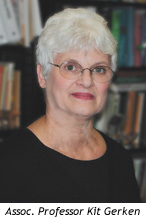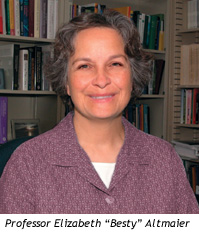|
Psychological
& Quantitative Foundations

Researching
Classroom Seating Arrangements
 Remember
your elementary school teacher who put Susie, "The Problem
Child," in the front row so she wouldn't distract the
other children? Or your high school history teacher who never
called on anyone beyond row three, regardless of whom else
had their hands up? There's no doubt seating arrangements
in classrooms both reflect and influence a teacher's ability
to organize, inform, inspire, and control the children in
their classes. But as a team of Eastern Iowa education researchers
has shown, good teachers understand that different seating
arrangements can serve particular purposes at various moments
in the teaching day. Remember
your elementary school teacher who put Susie, "The Problem
Child," in the front row so she wouldn't distract the
other children? Or your high school history teacher who never
called on anyone beyond row three, regardless of whom else
had their hands up? There's no doubt seating arrangements
in classrooms both reflect and influence a teacher's ability
to organize, inform, inspire, and control the children in
their classes. But as a team of Eastern Iowa education researchers
has shown, good teachers understand that different seating
arrangements can serve particular purposes at various moments
in the teaching day.
Along
with two school psychologists and an elementary school counselor,
School Psychology Associate Professor Kit Gerken has studied
the effects of seating arrangements in 294 regular Cedar Rapids
elementary school classrooms. The study's principle investigator
was James Patton, school psychologist with the Grant Wood
Area Education Agency, site supervisor for many University
of Iowa school psychology interns, and former lecturer at
the University. The research, which replicated a study conducted
by Patton, Gerken, and others 12 years earlier, involved actually
mapping classroom seating arrangements as well as interviewing
teachers about when and why they organized children in particular
patterns.
"There's
no one right, all-purpose way to arrange students," Gerken
said, "and depending on what they are trying to accomplish,
teachers often use different seating arrangements during any
one day."
The
new study, however, found a dramatic decline in the percentage
of teacher preference for row seating during the last dozen
years. According to the team's 1989 study, 44 percent of K-6
classrooms in Cedar Rapids used row seating. The most recent
survey found that number had dropped to 13 percent.
"The
teachers we surveyed," Patton said, "appear to believe
that 'cluster' seating designs are preferable to 'row' and
'perimeter' designs because clusters foster cooperative learning."
In
a more recent study, Patton found that elementary students
are much less likely to agree with their teachers' assessment
of the benefits of cluster seating arrangements. "Many
of the surveyed students judged 'rows' and 'perimeters' as
optimal for learning," Patton said, "because those
arrangements were perceived to reduce distractions and provide
a clearer view of teachers."
Teachers
do understand the positive attributes of both row and cluster
arrangements. Rows, of course, minimize distractions, encourage
students to look at the teacher, and enhance the uniform learning
of informational material such as the rules for fire drills.
On the other hand, cluster seating enables more cooperative,
self-directed learning and can encourage self-confidence,
creativity, and acceptance of diversity.
"Neither
approach is magic," Gerken said. "Regardless of
how children are seated, teachers must monitor and manage
the learning process." -by Jean Florman

Altmaier
Recognized For Contributions To Counseling Health Psychology
 Professor
Elizabeth "Betsy" Altmaier received the prestigious
Dorothy Booz Black Award for Outstanding Achievement in Counseling
Health Psychology. Professor
Elizabeth "Betsy" Altmaier received the prestigious
Dorothy Booz Black Award for Outstanding Achievement in Counseling
Health Psychology.
Given
by Division 17 of the national American Psychological Association
(APA), the award encourages and recognizes outstanding research
and practice in counseling health psychology for those who
have made a primary contribution in research and practice
of counseling health psychology focused on health-related
processes and outcomes.
Altmaier's research focuses on the psychosocial sequelae of
bone marrow transplant treatment.
"I
explore what psychological and social complications ensue
from such treatment and look at how people work to solve those
problems," said Altmaier, a licensed psychologist.
Altmaier
was named an APA Fellow in 1986, and in 1994 the national
APA recognized her for making a "distinguished contribution
to education and training in psychology." She is currently
serving as editor of the APA's Clinician's Research Digest.
She
has published or been co-author or editor of numerous articles,
chapters and books on a wide range of topics, among them helping
students manage stress, intervention in occupational stress,
setting standards in graduate education in psychology, children
and life-threatening illnesses and counseling cancer patients,
minority students and the hearing impaired. -by Stephen Pradarelli

|